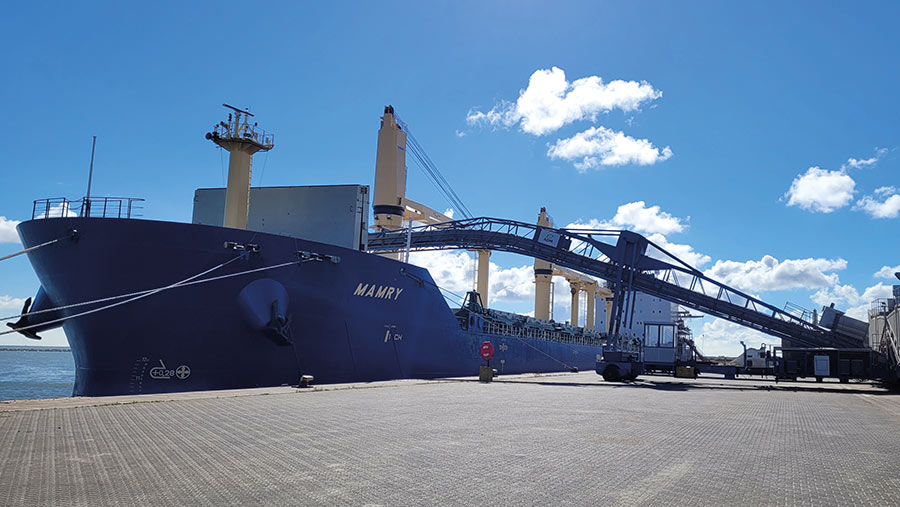How the drop in the pound will affect farming sectors
 © ADM Agriculture
© ADM Agriculture Sterling’s slide against both the US dollar and the euro following the emergency Budget on 23 September will affect all farm sectors.
After falling to a low of €1.09 on Monday 26 September, it remains weak despite some slight recovery, standing at €1.12 midweek. At the same point the pound was at $1.07 against the US dollar, having started 2022 at $1.35.
See also: Poor exchange rate limits Arla October milk price rise
While a weak sterling makes UK exports more attractive, it pushes up costs for many inputs, including machinery, fertiliser and feed ingredients such as maize and soya.
British Meat Processors Association chief executive Nick Allen said: “From a farming perspective, this is probably helping on the whole – a weaker pound has always been good for exporting, and that helps to keep the farmgate price up.”
Lamb
Deadweight SQQ lambs averaged 524.8p/kg in the week to 24 September, up 1.2p/kg on week-earlier levels.
Live markets in the week to Tuesday 27 September recorded an SQQ of 228.75p/kg, with prices dropping 9.33p/kg on the previous week.
Despite the weaker sterling, demand for lambs was subdued in the past week, with planned strikes at French ports expected to disrupt export trade, although this dispute has now reportedly been resolved.
Mr Allen said with domestic sales bland all round, the export market was propping up the farmgate lamb price.
Each year, anywhere between 25% and 40% of the UK lamb crop is exported. Consultant Andersons partner Michael Haverty said while current exchange rates can be a positive for lamb in the short term, in the longer term there would be issues in terms of consumer affordability.
The volume of lamb sold at retail was down 17.9% on the year during the 12 weeks ending 4 September, and overall spend was down 9.6% on the year, according to Kantar data.
Beef
Steers averaged 440p/kg deadweight and heifers 437.1p/kg for the week ending 24 September, both up marginally on the previous week.
Mr Haverty said: “In any given year, about two-thirds of beef imports come from Ireland, so relative to the euro strengthening against sterling, that will make Republic of Ireland exports to the UK a bit more expensive.”
He believes the exchange rate will offer some support to UK farmgate prices, but does not think it will help much in the long term, especially with Australian and New Zealand beef imports coming in at some stage next year.
Pork
About half the pigmeat consumed in the UK is imported.
Mr Allen said: “The European pig price is lower than the UK farmgate price, so the pressure on the pound makes it less attractive to import pork and will help the home market to some degree.”
Domestic demand for pork is falling, with volumes sold at retail down 3.6% on 2021 levels during the 12 weeks ending 4 September.
Dairy
The effect of a weaker pound was evidenced this week with Arla’s announcement that its quarterly currency-smoothing mechanism had reduced its UK members’ price rise by 0.33p/litre to deliver a 0.55p/litre increase.
Some dairy exports will benefit from a weaker sterling, which could in turn help farmgate prices.
David Evans, managing director at Millbrook Dairy Company, said even before the government’s announcement last week, European cheese buyers were paying £200/t more than UK retailers for cheddar.
“The UK will become the shopping basket for European cheese suppliers. More cheese will go out of the UK and less cheese will be imported. Cheese stocks in the UK will become tighter, and this will inevitably push UK cheese prices higher.”
Grain
Midweek, the November 2022 UK feed wheat futures contract was at £292/t, up £10/t on the week.
Peter Collier, senior adviser at CRM AgriCommodities, said: “From the start of August through to now, UK feed wheat has become more export-competitive. It had been at a small premium to European markets, but we are now at €15-€20/t below the European market looking at May 2023 contracts.”
Mr Haverty said while a weak sterling offered some assistance to make UK feed wheat exports more competitive, rises in farm input costs will affect arable profitability.
While the drop in sterling’s value encourages UK grain exports, it adds cost for those feeding both domestically produced grains, as well as to imported feed ingredients.
Quotes for HiPro soya meal midweek were at £545/t delivered to farm for October, up by £3/t on a week earlier.
